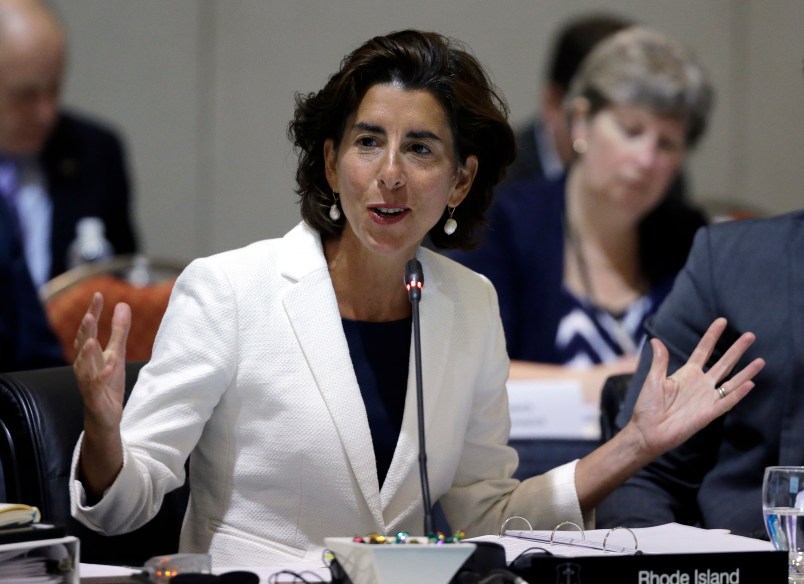PROVIDENCE, R.I. (AP) — The nation’s governors gather this week amid great uncertainties for their states — on health care, solutions to the opioid overdose epidemic, even how to address the effects of climate change without help from the federal government.
Proposed changes to the nation’s existing health care law will be front and center as Republican leaders in the U.S. Senate seek ways to salvage their overhaul effort.
Governors from both parties have spoken out against elements of the most recent bill, which could have enormous consequences for the states. Their nonpartisan group, the National Governors Association, has called on the Senate to give governors a say in shaping any reforms.
Their summer meeting begins Thursday in Providence and will include an address by Vice President Mike Pence.
Governors in states that expanded Medicaid under former President Barack Obama’s health care law are especially concerned as Republicans in Congress try to make good on their repeated promises to repeal and replace the law.
A bill that passed the House and one proposed in the Senate eventually would phase out the federal subsidy that most states used to expand Medicaid coverage to low-income adults who don’t have children at home. The expansion has provided coverage to about 11 million Americans in 31 states.
The GOP bills also would cap how much the federal government would pay for state-run Medicaid programs in the future while giving states more say over how to use the money they do receive. Medicaid is the biggest source of federal revenue for states and is among the largest expenses in most state budgets.
“It’s important for us to figure out a way to speak with one voice to the Trump administration to explain that this is going to hurt a lot of people in a lot of states, regardless of whether there’s a Democrat or Republican in the governor’s mansion,” said Rhode Island Gov. Gina Raimondo, a Democrat who is hosting the summit.
Reaching a consensus on the future of the Affordable Care Act is proving difficult, in part because some states expanded their Medicaid programs while others did not. Those that did not also would have to grapple with the cuts to Medicaid overall.
In either case, states would have to figure out how to afford coverage for low-income residents or deal with people who would go without insurance and turn up in emergency rooms when they needed care.
Yet many governors also face turmoil in their state’s private health insurance market, as people who do not get coverage through their employer or Medicaid have faced skyrocketing premiums and fewer choices.
Iowa Gov. Kim Reynolds, a Republican, said she wants Congress “to get something done” on replacing the Affordable Care Act but declined to offer specifics. In Iowa and many other states, steep losses have forced carriers to exit the insurance exchanges set up under the Obama-era law.
Governors prefer a bipartisan approach to any changes, said Massachusetts Gov. Charlie Baker, a Republican who works with a Legislature controlled by Democrats.
“Many times, one of the big messages we deliver to our colleagues in Washington is you should all try to work a little harder to get along with one another and find common ground,” he told reporters Tuesday when asked about the health care debate.
Governors from more than 30 states and the territories of Puerto Rico and the U.S. Virgin Islands have said they will attend the gathering in Rhode Island. A governors-only session will give the chief executives a chance to ask questions of U.S. Health and Human Services Secretary Tom Price and Seema Verma, the administrator of the federal Centers for Medicare and Medicaid Services.
Medicaid funding is a key topic for governors for another reason: It’s become essential in states’ ability to address the opioid addiction crisis. Discussing the widespread problem of overdoses from prescription painkillers and illicit drugs such as heroin and fentanyl is on the meeting’s agenda.
Also up for discussion is how to move forward on ways to combat climate change after the Trump administration said it would pull the U.S. out of the Paris climate pact.
Raimondo, the Rhode Island governor, said she wants to see governors collectively say they will commit their states to the Paris standards and thinks they can work directly with world leaders to address the problem.
Among those expected to attend is Canadian Prime Minister Justin Trudeau, who is scheduled to speak about international collaboration and has said he wants to find common solutions on climate change.
Trudeau has said he was “deeply disappointed” with Trump’s decision to withdraw from the Paris agreement. Foreign dignitaries have attended the association’s meetings in recent years, though not heads of government.






